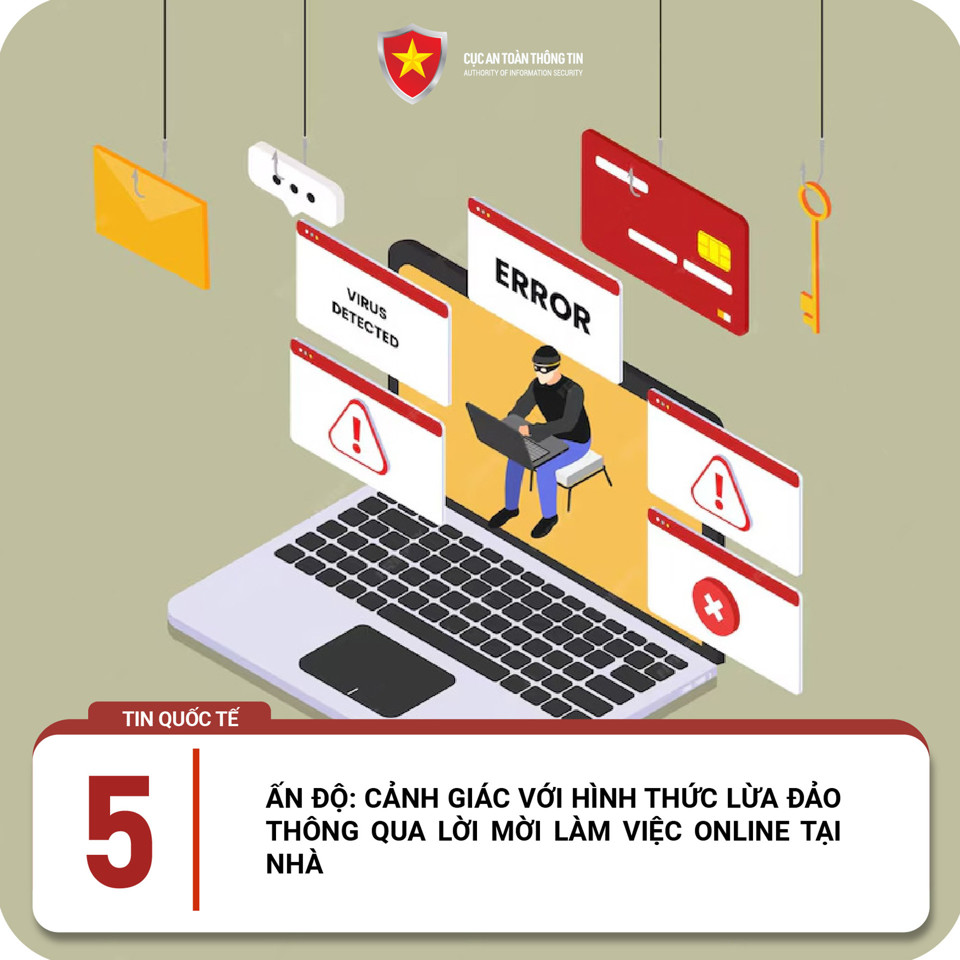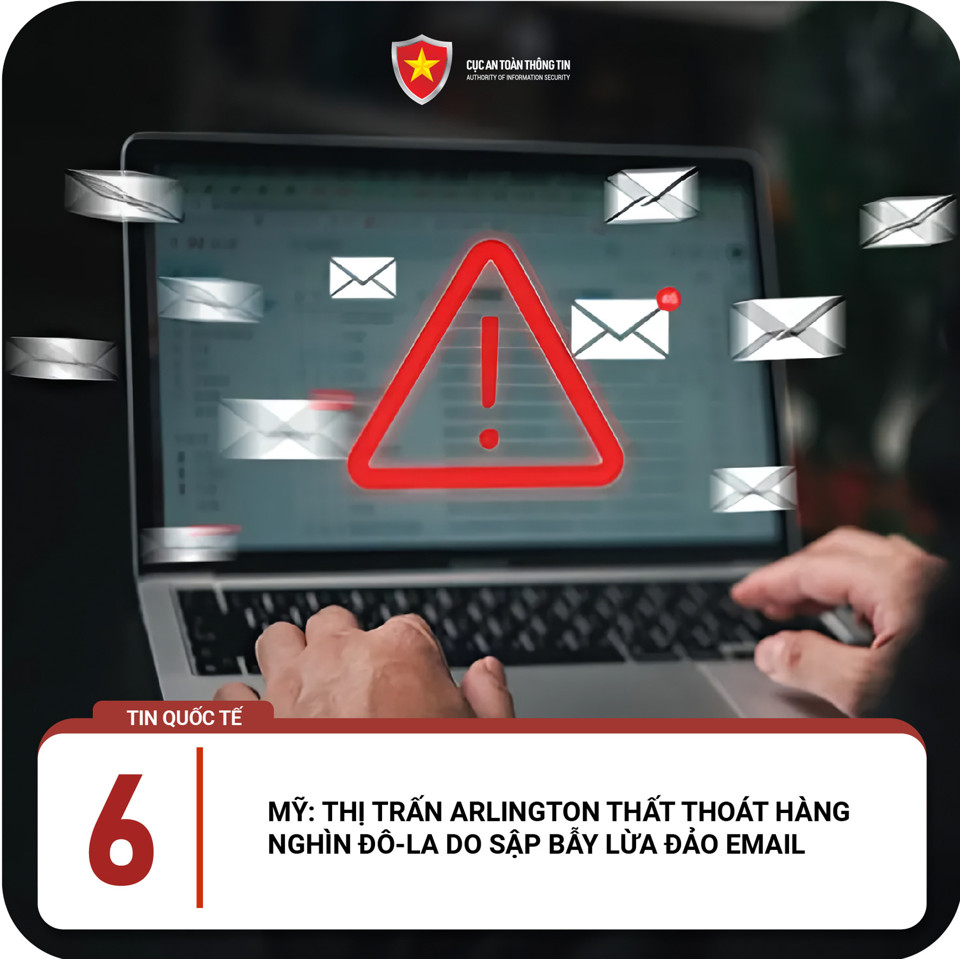In the content of the 'Weekly News' about the recent situation of online fraud in cyberspace, the Department of Information Security (Ministry of Information and Communications) continuously warned about the tricks of impersonation fraud. During the week from June 10 to June 16, along with the assessment that impersonation fraud is becoming more and more sophisticated, the Department of Information Security also warned domestic Internet users about some fraud tricks that are commonly used by cybercrime groups:

According to the Department of Information Security, recently, scammers have created websites, Zalo groups, and emails impersonating units of the Ministry of Education and Training to post and provide false information and images to defraud and appropriate people's property. The subjects also included advertisements for "Receiving applications for Principals/Vice Principals, Treasurers"; "Contributing to the welfare fund for children in mountainous areas"..., with the commitment that participants will be able to work at units within the Ministry of Education and Training. The Ministry of Education and Training affirmed that it did not coordinate or authorize any unit to guide or receive people's applications for the above programs.

Recommending people to be careful when using unofficial information sources, the Information Security Department also recommends that people do not follow instructions, do not contact websites/Fanpages with advertising content for services "Receiving documents of Principals/Vice Principals, Treasurers"; "Contributing to the welfare fund for children in mountainous areas". People also do not transfer money to subjects to be guided, receive, and complete documents; Do not provide personal information in any form.
Appropriating nearly 1.4 billion VND with the trick of investing in fake projects
A woman in Hanoi was recently scammed out of nearly VND1.4 billion by an acquaintance on social media, using a scam to invite her to invest in a project called “Vinpearl” (impersonating a Vingroup project) and open an account at the link “vinpearl1.vingroupsvn.com”. After following the instructions and transferring nearly VND1.4 billion to the accounts provided by the subject, the victim was unable to withdraw the money even though the investment was profitable and was asked to continue depositing more money. Suspecting that she had been scammed, the victim reported it to the police.

According to the analysis of the Information Security Department, the above scam is a scam that begins with building a relationship to gain the victim's trust, then inviting investment with the promise of high profits to appropriate property. To avoid this, people need to be vigilant with subjects who meet through social networks; Verify the identity of the subject by learning about them, requesting address information, contact phone number and even requesting to meet in person. People also need to be vigilant against requests to deposit money, invest or participate in financial transactions of unknown origin; Do not rush to follow the subject's requests or instructions and absolutely do not share personal information or bank account information.
Warning about fraudulent investment tricks in stocks and virtual currency
The Department of Information Security said that the situation of people being scammed by criminals to invest in international securities, virtual currencies, and digital currencies to appropriate assets is becoming more common and sophisticated. The subjects organize conferences and seminars with advertisements about international securities, virtual currencies, and digital currencies, with very high profit levels to attract people and investors. The subjects ask people and investors to transfer money before starting transactions; usually in the form of registration fees, participation fees, or deposits. When they see that people are no longer able to transfer money, the subjects will disable the account, block communication to appropriate the amount that the victim has transferred...

The Information Security Department recommends that people be cautious when being invited to invest in international securities, virtual currencies, and digital currencies; they should seek advice from experts and lawyers before investing to avoid losing money from fraudulent investment platforms and companies. People should also not participate in events, conferences, and seminars calling for investment related to finance, securities, virtual currencies, and digital currencies.
Impersonating employees and leaders of lottery companies to defraud lottery numbers
The police of Yen Dinh district (Thanh Hoa) have just investigated and arrested a group of subjects who specialize in fraud and property appropriation in the form of giving out lottery numbers. Specifically, the subjects created many fake Facebook accounts and posted articles impersonating employees and leaders of the Northern Lottery Company and said that they have the ability to know in advance and interfere with lottery results, so they can give victims 100% accurate lottery numbers.

Faced with the above-mentioned fraud tricks, the Information Security Department recommends that people be vigilant against services floating on social networks; Do not use any form of service without verifying the identity and reputation of the subject or organization; Do not rush to follow the subject's instructions; Do not provide personal information or bank account information in any form. When detecting cases with signs of fraud, people need to immediately report to the police.
Beware of scams offering online work at home jobs
The Indian government has recently warned about the emergence of a scam using text messages inviting people to work from home, promising attractive salaries. Fraudsters will send messages impersonating reputable corporations and companies in many different fields.
After contacting, requesting to complete the registration procedure and pay a fee, the subject sends a link for the victim to fill in the bank information. This information is used by the subject to transfer the victim's money to their bank account, then ask the victim to provide an OTP code. At this time, the victim thinks this is a transaction to pay the procedure fee. After successfully appropriating the money, the subjects block the victim's messages and delete all information on the personal page.

The Information Security Department recommends that when receiving messages via social networking platforms with the above content, people need to report those accounts; Do not click on any links sent by the subjects and do not provide personal information; Do not install any applications from strange links, do not enable the "install applications from unknown sources" mode on smartphones.
Lost money due to email scam by hacker group impersonating
Recently, the government of Arlington town (Massachusetts, USA) lost more than 445,900 USD (equivalent to nearly 11.3 billion VND) because of a scam by a group of hackers impersonating a construction material supplier. The town was tricked into transferring money on a monthly basis to serve the school construction process.

Initially, the criminal group took control of email accounts owned by employees working in the town’s budget management department. With access to the email system, the group was able to capture the entire content of messages, delete them, and turn off notifications when new messages arrived. Thanks to that, they easily impersonated the construction material supplier that the town was cooperating with, sending messages to the staff with a request to change the form of payment from cash to bank transfer within a period of 4 months.
From the above incident, in addition to the requirement to focus on system security, the Information Security Department also recommends that agencies and organizations regularly disseminate information about fraud to officers and employees. Before transferring money, people need to carefully check the identity of the subject, through the official phone number or meet directly.

Impersonating a peacekeeper to defraud and appropriate propertyBy impersonating a peacekeeper who needed someone to receive money sent from abroad to Vietnam, the scammer defrauded and appropriated more than 1 billion VND from a woman in Binh Phuoc.
Source: https://kinhtedothi.vn/vi-sao-nhieu-nguoi-van-sap-bay-lua-dao-mao-danh-tren-khong-gian-mang.html


![[Photo] President Luong Cuong attends the inauguration of the international container port in Hai Phong](https://vphoto.vietnam.vn/thumb/1200x675/vietnam/resource/IMAGE/2025/5/13/9544c01a03e241fdadb6f9708e1c0b65)
![[Photo] President Luong Cuong awarded the title "Heroic City" to Hai Phong city](https://vphoto.vietnam.vn/thumb/1200x675/vietnam/resource/IMAGE/2025/5/13/d1921aa358994c0f97435a490b3d5065)
![[Photo] Many people in Hanoi welcome Buddha's relics to Quan Su Pagoda](https://vphoto.vietnam.vn/thumb/1200x675/vietnam/resource/IMAGE/2025/5/13/3e93a7303e1d4d98b6a65e64be57e870)
![[Photo] Prime Minister Pham Minh Chinh receives Ambassador of the French Republic to Vietnam Olivier Brochet](https://vphoto.vietnam.vn/thumb/1200x675/vietnam/resource/IMAGE/2025/5/13/f5441496fa4a456abf47c8c747d2fe92)






























































































Comment (0)